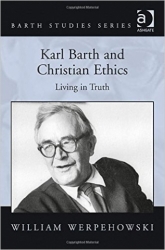Reviewed by Carsten Card-Hyatt
Since the first edition of his Romans commentary, Karl Barth’s theology has been dogged by the charge that the absolute priority of divine action in his thought renders meaningful talk of ethics impossible. In more recent years, the charge has been refined somewhat, to claim that even if Barth allows for meaningful human action in principle, he does not provide resources for a rich description of moral character and deliberative moral reasoning that is the hallmark of the best, and most useful, theological ethics.
In the world of Anglophone Barth studies, the last twenty years or so have seen a raft of studies taking up this charge and arguing persuasively that Barth can and should be read as a moral theologian of range and insight, whose work can be generative for theological ethics today. Largely through journals, William Werpehowski (currently the Robert L McDevitt, K.S.G., K.C.H.S. and Catherine H. McDevitt L.C.H.S. Professor of Catholic Theology at Georgetown University) has been an one such able defender of Barth as a theological ethicist for more than thirty years, and his recent volume Karl Barth and Christian Ethics (Barth Studies Series. Ashgate, 2014) draws together a number of these studies. Not content, however, to consider Barth as a theological ethicist in his own right, Karl Barth and Christian Ethics also does theological ethics in a Barth inflected manner. The volume is thus split into two parts: the first four chapters defend Barth’s ethical thought from some of the charges outlined above, while the remaining six chapters are devoted to constructive ethical thought done in a broadly Barthian mode.
As a whole, the volume is a recommendation of the consistency and vitality of Barth’s moral theology. There are four features that characterize Barth’s theological ethics, thinks Werpehowski. The first, the primacy of the sovereign decision of God over human moral reality, the ‘divine command’ of Barth’s Reformed ethics, is considered by many of Barth’s critics to be the most problematic for theological ethics, and receives a spirited defense by Werpehowski in the early chapters. The second, in close relation to the first, is that human freedom is not squelched by genuinely found within the sphere of God’s sovereign rule. Third, Barth’s theological ethics exhibits the ‘dynamic realism’ (p. xii) of God’s reality constituting acts, place the human subject within a divine history that precedes and characterizes its existence, establishing a genuine ‘moral space’ in which its actions can have meaning. Fourth and finally, Barth conceives of inquiry into theological ethics as faithful, free and rational. Thus, theological ethics is itself characteristic of the moral life to which God has called humanity in Christ. Barth’s own work, argues Werpehowski, exhibits these features and offers a model for those who follow in his footsteps.
The first part of the volume shows Werpehowski to be a careful, sympathetic reader of Barth, sensitive to the place held by ethics within Barth’s broader theological vision. Particularly strong is Werpehowski’s defense of Barth against the charge that the divine command ethic is occasionalist or voluntaristic, or that it results in an intuitionist model of ethical deliberation. Part of the strength of Werpehowski’s argument comes from his careful analysis of particular passages of Barth’s work, but what gives his readings real force is his awareness of how Barth’s broader theological project works. A notable example is in his response to Nigel Biggar’s charge that Barth ‘short circuits’ ethical responsibility by denying a place to ethical deliberation in favor of ‘hearing’ the divine command ever anew in each situation. Werpehowski shows that Barth does allow for a kind of ethical deliberation, a ‘practical casuistry’ (as opposed to a principled one), but then goes on to show how Biggar misses Barth’s broader point, which is not to deny ethical deliberation but displace it from being the central element in moral thought. Rather, Barth shows how there can be ‘an approach to the moral life that gives pride of place to the divine prevenience and that orders moral “rationality” …to it.’ (p. 68).
Werpehowski’s description of such an approach serves well to describe his own deliberations in the second section. Here, Werpehowsk draws not only on Barth but on a range of other sources, largely though not exclusively from the tradition of Catholic moral and social thought. Though hardly Barthian in a didactic sense, all of these essays exhibit the same desire to order Christian moral thinking to divine acts with a particular Christological focus, which has already been shown to be Barth’s pattern. Some might wonder if Barth can sit alongside Thomist appeals to virtue quite as readily as Werpehowski makes out, but it is refreshing to see Barth not just appreciated but employed in the service of ethical reflection. In one sense, by surveying a broad array of topics, from parenting to the ‘double command’ to practical wisdom anew, Werpehowski demonstrates what being a real student of Barth, or any great theologian, means: a drive to think through theological existence today.
While moving from Barth scholarship to constructive theological ethics is salutary in many ways, the volume could perhaps have benefited from greater internal consistency. Particularly in the second half it reads more as a disparate collection rather than a coherent whole. Further, as some of the earlier chapters in particular were originally published some time ago, more effort to expand their frame of reference to include recent developments in Barth studies would have been welcome. However, because of its scope and rigor, both Barth specialists and others with a general interest in theological ethics will find much of value here.
Carsten Card-Hyatt is a PhD candidate in Divinity: Systematic Theology at St Mary’s College, University of St Andrews, Scotland.
